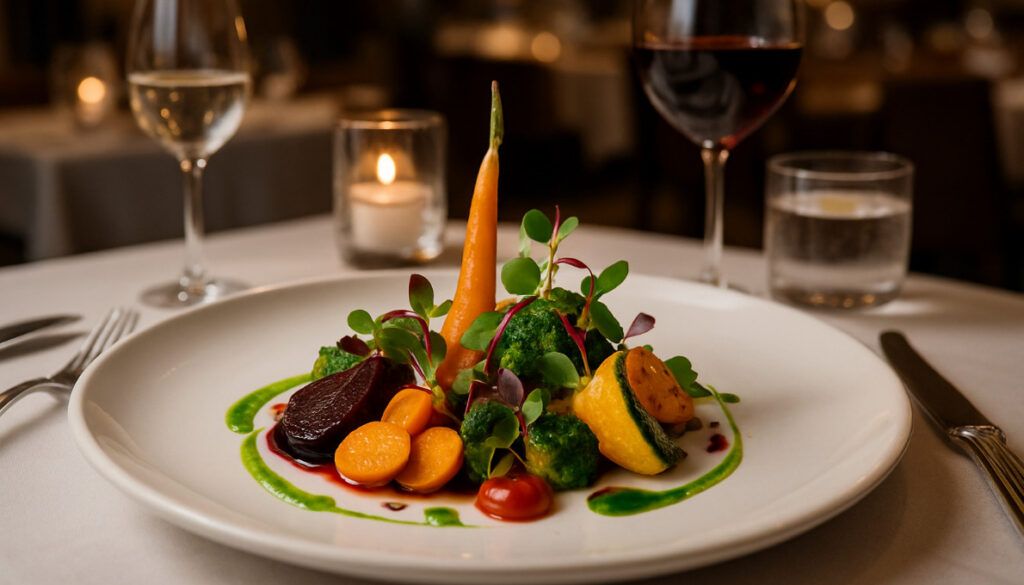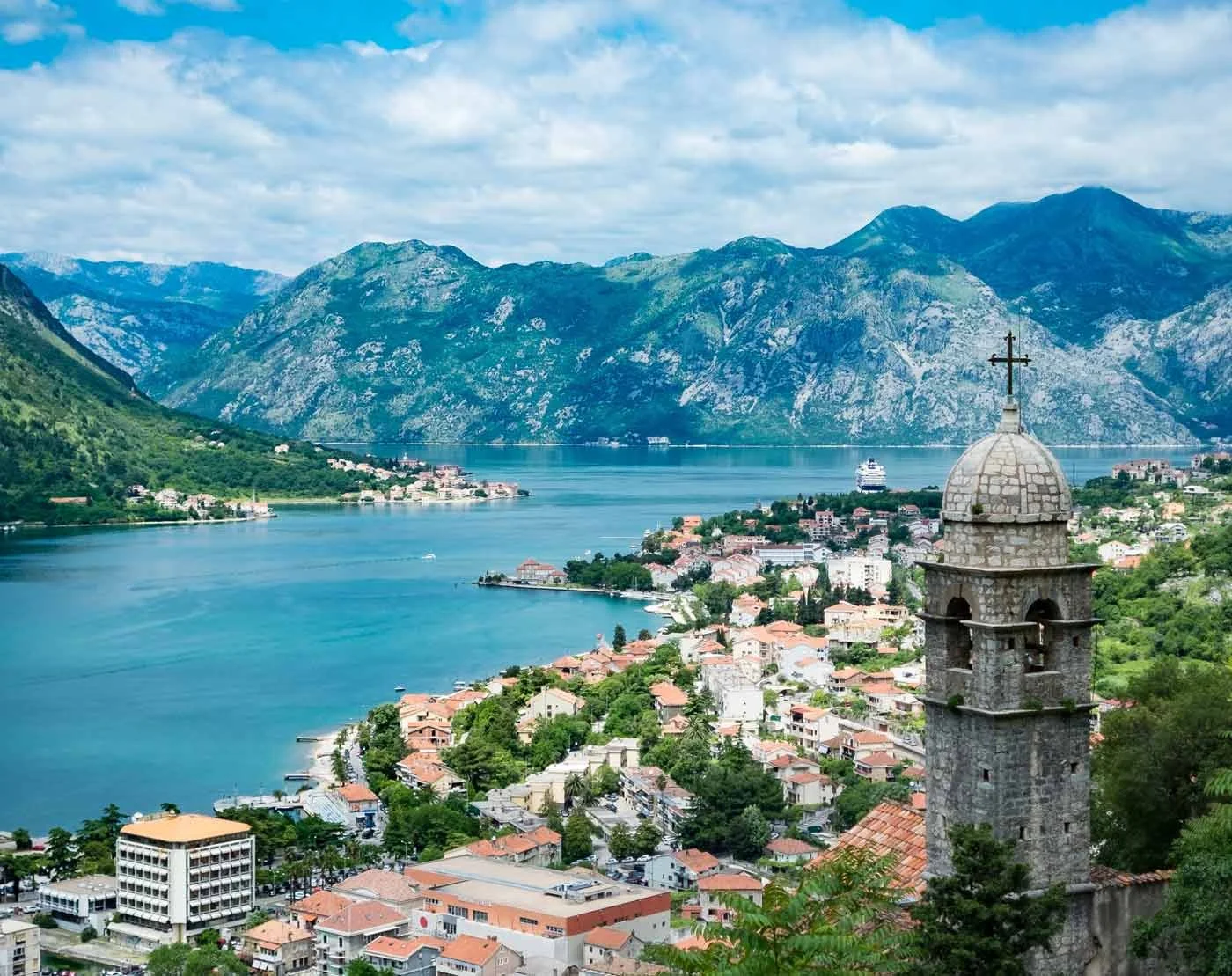The Culinary Revolution: Plant-Based Fine Dining Explained
Ever wondered what happens when world-class chefs decide to play exclusively with plants? The answer is magical, surprising, and utterly delicious. Plant based fine dining isn’t just a meal—it’s a movement that’s reshaping our culinary landscape.
At its heart, this approach celebrates the extraordinary potential of vegetables, fruits, grains, legumes, nuts, and seeds without any animal products whatsoever. What was once considered a niche corner of gastronomy has blossomed into a respected mainstream category, with prestigious establishments like Eleven Madison Park and ONA earning coveted Michelin stars purely through plant wizardry.
When you sit down at one of these tables, you’re not just getting dinner—you’re experiencing a carefully orchestrated symphony of flavors that typically costs between $85-150 per person for the tasting menu, with optional beverage pairings adding another $45-75 to your evening. The exclusivity is real: many of these restaurants require booking 2-12 months ahead, with some like Gauthier Soho in London booked solid through 2025.
The pioneers leading this delicious revolution include Eleven Madison Park in New York City, Gauthier Soho in London, ONA in France, and Maiden in Texas—each offering their unique interpretation of plant-powered luxury.
“I felt constrained by the limited palette that animal foods impose,” explains Chef Daniel Humm of Eleven Madison Park. “I believe that I have much more room to innovate when using the vast variety provided by plant-based foods.”
This isn’t simply about removing ingredients—it’s about celebration and reinvention. The best plant based fine dining experiences transform humble vegetables through masterful techniques: fermentation that develops complex umami flavors, smoking that adds depth, aging that concentrates essence, and artistic presentations that engage all senses.
The demand speaks volumes. Since changing to an entirely plant-based menu in 2021, Gauthier Soho can’t keep up with reservation requests, now fully booked for parties of two or more until February 2025. Similarly, Maiden in Fort Worth has found its niche with an exclusive 8-course vegan journey priced at $150 per person, complemented by specialized beverage pairings that include thoughtful zero-proof options.
Whether you’re a committed vegan, an environmental advocate, or simply someone who loves extraordinary food, plant based fine dining offers a fresh perspective on culinary possibility—proving that when vegetables take center stage in visionary hands, the results can be nothing short of revolutionary.

Why This Guide Matters
If you’ve ever been curious about how a carrot can bring tears to your eyes (in the best possible way) or wondered what justifies a three-figure price tag for a meal without a steak in sight, you’re in the right place. This guide matters because plant based fine dining isn’t a fleeting trend—it represents a fundamental shift in how we experience luxury, sustainability, and pleasure on a plate.
The world of vegan fine dining can be intimidating at first glance. What should you expect? Is it worth the splurge? Which restaurants truly deliver transformative experiences? Whether you’re planning a milestone celebration, mapping out your next culinary trip abroad, or simply fascinated by how humble vegetables can become edible art, we’ve gathered everything you need to steer this exciting landscape with confidence.
From the hushed dining rooms of New York to intimate French countryside kitchens, innovative chefs are proving daily that plants can deliver extraordinary experiences that don’t just match traditional fine dining—they often create entirely new categories of delight. Join us as we explore this delicious revolution one remarkable restaurant at a time.
Plant Based Fine Dining 101: Definition, Origins & Evolution
Plant based fine dining brings together the worlds of culinary luxury and plant-forward ethics in perfect harmony. These aren’t your casual vegan cafés—think neat establishments offering carefully crafted multi-course tastings, refined atmospheres, exceptional service, and thoughtful beverage programs, all without a single animal product.
What started as a niche experiment has blossomed into a respected culinary category that even the prestigious Michelin Guide now celebrates. Today’s plant-based fine dining venues aren’t mere alternatives to “real” restaurants—they’re destination-worthy in their own right, drawing in both dedicated vegans and curious omnivores through pure culinary brilliance.
| Traditional Fine Dining | Plant-Based Fine Dining |
|---|---|
| Animal proteins as centerpiece | Vegetables as the star |
| Butter and cream as foundation | Plant oils, nuts, and ferments for richness |
| Limited options for vegetarians | Entire menu accessible to all diets |
| Classical French techniques | Global and innovative techniques |
| Emphasis on luxury ingredients | Emphasis on change of humble ingredients |
| Wine-focused pairings | Diverse pairings (wine, juice, tea, zero-proof) |
| Higher environmental footprint | Lower carbon impact and waste |
The journey into plant based fine dining looks different for each chef. For Kirk Haworth of Plates London, personal health challenges sparked the transition. For Daniel Humm of Eleven Madison Park, it was about creative freedom and environmental responsibility. As Humm puts it: “I felt constrained by the limited palette that animal foods impose. I believe that I have much more room to innovate when using the vast variety provided by plant-based foods.”
Curious about broader sustainability trends in the food world? Check out more about Food Sustainability Trends to see how plant-based dining fits into the bigger picture.
How It Differs from Traditional Fine Dining
Traditional fine dining has always put animal proteins center stage—the perfectly seared steak, the immaculately cooked fish, or that indulgent foie gras. Plant based fine dining completely flips this script, elevating vegetables from supporting actors to undisputed stars.
This fundamental shift demands an entirely different approach to creating menus. Rather than building dishes around meat with vegetable garnishes, plant-based chefs must extract maximum flavor, texture, and visual appeal from plant ingredients. Their plates often feature more components, more intricate preparations, and deeper exploration of techniques like fermentation, aging, and smoking to develop those complex flavors we crave.
Without butter, cream, eggs, and other animal-based ingredients that traditionally provide richness, chefs must get creative. They turn to nuts, seeds, plant oils, and fermentation to create alternative sources of depth and umami. At Gauthier Soho in London, for instance, their cashew brie ages for five months to develop complexity that rivals traditional cheese.
Even the service style evolves in plant based fine dining. With less emphasis on protein cookery, presentation and storytelling become even more crucial. Servers often provide rich explanations of unusual ingredients or techniques, adding an educational dimension that improves the overall experience.
Historical Timeline
The plant based fine dining movement has accelerated dramatically recently, but its roots stretch back decades:
The 1980s and 1990s saw early pioneers like Greens Restaurant in San Francisco and Terre à Terre in Brighton establishing sophisticated vegetarian dining, though not quite reaching traditional fine dining’s formality or recognition.
1996 marked a watershed moment when Joia in Milan became Europe’s first vegetarian restaurant to receive a Michelin star. Chef Pietro Leemann’s artistic approach to vegetable cuisine helped legitimize plant-focused gastronomy in the fine dining world.
In the early 2000s, upscale vegetarian restaurants like Dirt Candy in New York City (2008) began gaining critical acclaim, proving that vegetable-forward cooking could be genuinely exciting and innovative.
Between 2010-2015, Vedge opened in Philadelphia (2011), earning recognition as “one of the best restaurants, period” according to Philadelphia Magazine—not just among vegetarian establishments. This period saw the rise of “vegetable-forward” cooking even at omnivorous restaurants.
2016 brought us ONA (Origine Non-Animale) in Arès, France, founded by self-taught chef Claire Vallée through crowdfunding after banks rejected her loan applications, deeming a vegan restaurant too risky.
2021 proved pivotal with two major milestones: ONA became the first fully vegan restaurant in France to receive a Michelin star, and Eleven Madison Park—previously ranked #1 on the World’s 50 Best Restaurants list—reopened after the pandemic with an exclusively vegan menu while maintaining its three Michelin stars.
From 2021 to Present, the movement has gained global momentum with exciting openings like Maiden in Fort Worth (2023) and established restaurants like Gauthier Soho in London transitioning to fully plant-based menus.
Interestingly, the COVID-19 pandemic became an unexpected catalyst for plant based fine dining. During lockdowns, many chefs found time to experiment with plant-based techniques, while growing environmental and ethical concerns accelerated consumer interest in sustainable dining options.
Eleven Madison Park (New York) – The Three-Star Vegan Icon
When Daniel Humm announced in 2021 that Eleven Madison Park—holder of three Michelin stars and formerly the World’s Best Restaurant—would reopen post-pandemic with an exclusively vegan menu, the culinary world was stunned. Many critics predicted disaster. Today, EMP stands as the only three-Michelin-star restaurant in the world serving an entirely plant-based menu, proving that plant based fine dining can reach the absolute pinnacle of global gastronomy.

The restaurant’s pandemic pivot wasn’t just dramatic—it was deeply personal and principled. While New York City weathered the worst of COVID-19, the EMP team quietly prepared over one million meals for frontline workers. This humbling experience, coupled with Humm’s growing environmental concerns, sparked a revelation: true luxury dining needed to evolve toward sustainability.
“I felt constrained by animal foods,” Humm has explained. “With plants, the creative possibilities seem endless.” This philosophy now drives the EMP experience, centered around a seasonal tasting menu (about $335 per person) that celebrates vegetables on their own magnificent terms.
Rather than mimicking meat, EMP’s kitchen celebrates the inherent beauty of plant ingredients. Take their treatment of tonburi, often called “mountain caviar,” where these tiny cypress seeds are transformed into a delicate course paired with earthy beets. Or consider their approach to celtuce, a Chinese stem lettuce few Americans have tasted, prepared through multiple techniques to showcase its versatility.
Behind the scenes, EMP maintains exclusive partnerships with specialty growers like Magic Farms to secure ingredients most diners have never encountered. The kitchen has become a laboratory of fermentation and umami development, with koji (the magical mold responsible for miso’s depth) playing a starring role in many dishes.
The restaurant’s commitment to craft is perhaps best displayed in their labor-intensive soba course. Working with master noodle maker Shuichi Kotani, the kitchen approaches this deceptively simple dish with almost spiritual discipline, changing buckwheat into silky, perfectly textured noodles that showcase Japanese culinary philosophy.
Wine lovers need not worry—EMP’s renowned beverage program remains exceptional. The sommelier team thoughtfully pairs each plant-based course with wines that complement rather than overpower: a vibrant 2019 Condrieu might improve an artichoke heart’s subtle complexity, while a mature 2008 Brunello brings warmth to heartier vegetable creations.
What makes EMP’s change particularly remarkable is that it hasn’t just maintained its three Michelin stars—it’s retained its soul. The restaurant still donates meals through its guest philanthropy program, connecting luxury dining with community support in a way that feels genuine rather than performative.
For those fascinated by the science behind vegetable-focused cuisine, recent research on vegetable umami helps explain how chefs like Humm create such satisfying experiences without traditional animal-based umami sources.
Despite initial skepticism that bordered on mockery from some corners of the culinary world, EMP has silenced critics and continues attracting global food pilgrims willing to book months in advance. In doing so, it has forever changed the conversation around what plant based fine dining can achieve at the highest levels of gastronomy.
Gauthier Soho (London) – French Elegance Reimagined
Tucked away in a charming townhouse in London’s vibrant Soho district, Chef Alexis Gauthier has created what might be the UK’s most coveted dinner reservation. When Gauthier Soho transformed from traditional French cuisine to fully plant based fine dining in 2021, few could have predicted the overwhelming response – tables for two or more are now completely booked until February 2025!
The restaurant’s ambiance strikes that perfect balance of intimate sophistication and warmth. Walking through the doors feels like entering a stylish friend’s home, albeit one with impeccable taste and world-class culinary credentials.
“Our ‘grand dîner’ is a celebration of what’s possible when you approach plants with respect and imagination,” Chef Gauthier often explains to guests lucky enough to secure a reservation. This ten-course journey reimagines classic French techniques without a drop of animal product in sight. The menu proudly declares it is “vegan for the animals,” reflecting Gauthier’s heartfelt ethical stance that drives his culinary vision.
The technical mastery on display here is nothing short of remarkable. Take the now-famous cashew brie – aged patiently for five whole months to develop layers of complexity that genuinely rival traditional dairy cheese. This isn’t quick-fix vegan food; it’s plant based fine dining that demands the same dedication to craft as any Michelin-starred establishment.
“We want everyone to feel welcome at our table,” explains the sommelier as she presents pairing options. Alongside traditional wine selections, Gauthier Soho offers exquisite juice pairings that receive the same attention to detail as their alcoholic counterparts. This inclusive approach ensures that everyone – regardless of dietary or drinking preferences – experiences the full magic of their meal.
Given the extraordinary demand, the restaurant requires a booking deposit – a standard practice among high-end vegan establishments facing unprecedented reservation pressures. Don’t worry though; it’s refundable with sufficient cancellation notice.
Gauthier Soho proves something remarkable: plant based fine dining can not only survive but thrive in cities with centuries-old culinary traditions. By maintaining the sophistication, meticulous service, and attention to detail that define traditional fine dining while embracing a fully plant-based approach, Gauthier has created a new vision of French gastronomy that looks confidently toward the future.
More info about Why Locally Sourced Ingredients Make a Difference
ONA (Arès, France) – Michelin Star Through Community Power
The story of ONA (Origine Non-Animale) reads like a culinary fairy tale that defied all odds in the heart of traditional French gastronomy. When self-taught chef Claire Vallée dreamed of opening a gastronomic vegan restaurant in Arès, France, she hit an immediate roadblock: traditional banks simply laughed at her concept, deeming a plant based fine dining establishment too risky and rejecting her loan applications outright.

Undaunted and passionate about her vision, Vallée turned to the community instead. Through crowdfunding, she managed to raise €10,000 from 126 supporters who believed in her mission when traditional institutions wouldn’t. But the community involvement didn’t stop with financing.
What happened next speaks volumes about the power of shared vision. Local painters, electricians, masons, and even complete strangers volunteered their time and talents through a work-funding initiative. Together, they transformed an empty space into a restaurant in just two months – a testament to collective belief in plant based fine dining as more than just a business venture but a movement worth supporting.
“Can we eat ecologically and ethically without giving up on pleasure? YES.” This simple yet powerful statement forms the core of Vallée’s philosophy. Her mission perfectly captures what plant based fine dining promises at its best – that sustainability and ethics can coexist beautifully with extraordinary culinary experiences.
The restaurant’s physical space reflects its values in every detail. Inside ONA, guests are surrounded by thoughtful eco-design choices: a custom-crafted cedar and copper bar gleams under lighting made from recycled paper. The walls feature water-based paints, while natural glassware catches the light. Even the furniture tells a sustainability story, sourced from domestic cooperatives that emphasize local craftsmanship and environmentally conscious production methods.
January 2021 marked a watershed moment not just for ONA but for plant based fine dining globally. In a country where culinary traditions are practically sacred and meat-centricity dominates fine dining, ONA achieved what many considered impossible – becoming the first fully vegan restaurant in France to receive a coveted Michelin star.
Vallée poetically describes her restaurant as “an ode to the living, a promise to sublime what nature has to offer.” This artistic approach to plant-based cuisine has helped redefine traditional French gastronomy, demonstrating that plant based fine dining can earn the industry’s highest accolades through creativity, technical excellence, and profound respect for ingredients.
In a country where foie gras and escargot have long defined luxury dining, ONA’s success represents a shift in what’s possible when passion meets purpose – proving that plant-based cuisine can stand shoulder-to-shoulder with traditional fine dining on the global culinary stage.
Maiden (Fort Worth) – North Texas’ Avant-Garde Tasting Menu
In a region where barbecue pits and steakhouses dominate the culinary landscape, Maiden stands as a refreshing revelation. Since opening its doors in June 2023, this innovative restaurant has claimed its place as North Texas’ first exclusively vegan, tasting-menu-only fine dining experience. Nestled within Fort Worth’s stylish PS1200 building, Maiden’s 2,100-square-foot space invites guests to start on an ambitious 8-course plant based fine dining journey priced at $150 per person.

What truly sets Maiden apart is its thoughtfully curated beverage program. Understanding that drinks are an essential component of any memorable dining experience, the restaurant offers three distinct pairing options to complement your meal. Whether you prefer a traditional wine pairing showcasing boutique vineyards, a mixed-drink trip featuring sake, craft cocktails, and artisanal beer, or a zero-proof selection for non-drinkers, Maiden ensures every guest enjoys a perfectly matched liquid accompaniment to their plant-based feast.
Step inside and you’ll immediately notice the restaurant’s self-described “moody” atmosphere, where plush blue velvet booths create intimate dining pockets perfect for savoring each carefully crafted course. The thoughtful design extends beyond the main dining room to include an inviting outdoor lounge with bar seating, offering diners flexibility in how they experience Maiden’s culinary artistry.
For those curious about Maiden’s approach but hesitant to commit to the full tasting experience, “Teatime at Maiden” offers a perfect introduction. Every Saturday from 11 am to 2 pm, this special service provides a more accessible entry point to the restaurant’s plant based fine dining philosophy without the full evening commitment.
The creative minds behind Maiden bring valuable experience from their previous venture, Spiral Diner & Bakery, but have dramatically liftd their culinary approach for this fine dining concept. As one delighted visitor enthusiastically shared, “Each dish is a work of art, showcasing the boundless possibilities of vegan ingredients!”
Securing your table at this groundbreaking establishment is simple through their Make Reservations portal on Tock. In just a short time, Maiden has established itself as a must-visit destination not only for local plant-based enthusiasts but also for culinary triprs seeking innovative plant based fine dining in perhaps the last place you’d expect to find it—the heart of Texas beef country.
Inside the Plant-Based Tasting Experience
What actually happens when you sit down for a plant based fine dining meal? While each restaurant crafts its own unique journey, there’s a special magic that sets these experiences apart from both traditional fine dining and casual vegan spots.

Ingredient Sourcing & Seasonality
The heart of extraordinary plant based fine dining begins long before anything reaches your plate. These restaurants don’t just order produce—they build relationships.
At Eleven Madison Park, the team works exclusively with Magic Farms to secure vegetables you simply won’t find elsewhere. Other restaurants partner with biodynamic growers who follow lunar cycles and treat their soil like a living ecosystem. I love how Vedge in Philadelphia accepts seasonality not as a limitation but as creative fuel, completely reimagining their menu based on what local farmers bring through their door.
Many chefs have gotten wonderfully obsessive about freshness. Urban gardens and rooftop growing spaces let them harvest herbs and microgreens just hours—sometimes minutes—before they land on your plate. There’s something magical about a chef excitedly explaining that the delicate flower garnishing your dish was picked from their garden that morning.
Foraging has become another cornerstone of plant based fine dining. Wild mushrooms, herbs, flowers, and seaweeds connect your meal to the surrounding ecosystem. At ONA in France, Chef Claire Vallée incorporates foraged elements that tell the story of the restaurant’s coastal surroundings. Each bite becomes a taste of place and time that simply can’t be replicated.
Signature Techniques & Dishes
The technical wizardry happening in plant based fine dining kitchens would impress even the most traditional French chef:
Fermentation reigns supreme in these kitchens. House-made misos, koji experiments, vegetable garums, and vinegars develop the deep umami flavors that make you forget you’re not eating animal products. Some restaurants maintain fermentation rooms that look like scientific laboratories, with precisely labeled jars tracking months-long experiments.
Smoking transforms familiar vegetables into something entirely new. When you taste Eleven Madison Park’s smoked asparagus, the depth of flavor is almost startling—how could something so simple become so complex?
Vegetable butchery treats produce with surgical precision. Chefs approach celery root with the same reverence a traditional chef might show a prime cut of beef. The careful cutting, aging, cooking, and resting creates textures you wouldn’t believe possible from plants.
Some signature dishes have become legends in the plant based fine dining world. Gauthier Soho’s five-month aged cashew brie demonstrates extraordinary patience—the cheese develops complex layers of flavor that rival dairy versions. Eleven Madison Park’s tonburi with beets pairs Japanese “mountain caviar” (cypress seeds) with multiple preparations of a humble root vegetable, creating something greater than the sum of its parts.
As Chef Vallée beautifully puts it: “Each dish is a promise to sublime what nature has to offer.” This philosophy guides these kitchens to transform the ordinary into the extraordinary.

Beverage Pairings Beyond Wine
While exquisite wines remain important, plant based fine dining has sparked a beverage revolution that’s thrilling for all palates.
Juice pairings have evolved from simple fruit drinks to complex compositions that follow the same principles as wine pairings. Imagine sipping a delicate blend of cucumber, apple, and herbs alongside a light first course, then progressing to richer, earthier combinations with concentrated beet or carrot as your meal intensifies.
Tea ceremonies have found their way into the dining experience too. At Maiden in Fort Worth, rare and aged teas are presented with the same reverence as fine wine. The server might explain how a particular oolong’s oxidation level complements the umami in your mushroom course.
Zero-proof cocktails have become works of art. These aren’t merely mocktails but thoughtfully crafted non-alcoholic drinks with house-made bitters, fermented elements, and technical flourishes like smoke or foam. They’re designed specifically to improve the flavors of your meal, not simply replace alcohol.
The beauty of this approach is its inclusivity. At Eleven Madison Park, the sommelier might recommend a crisp 2018 Riesling with one course and a robust 2008 Brunello with another. Meanwhile, at Maiden, you can choose between wine, mixed-drink, or entirely zero-proof pairings for your whole experience. Everyone at the table gets to enjoy thoughtfully paired beverages that improve their plant based fine dining journey, regardless of their relationship with alcohol.
For more on how these experiences fit into broader dining trends, check out The Rise of Experiential Dining.
Sustainability & Future Outlook for Plant Based Fine Dining
When you dine at a plant based fine dining restaurant, you’re participating in something bigger than just a meal. These establishments have woven sustainability into their very DNA – it’s not an afterthought or marketing gimmick, but the heartbeat of their entire operation.

Walk into the kitchen of a place like Eleven Madison Park, and you’ll witness the circular economy in action. Carrot tops become fermented garnishes, mushroom stems transform into rich stocks, and vegetable scraps return to garden soil through comprehensive composting systems. Many chefs have completely reimagined their kitchens, installing energy-efficient equipment and water-saving technologies that dramatically reduce their environmental footprint.
This profound commitment to the planet hasn’t gone unnoticed. In 2020, the Michelin Guide introduced the Green Star to recognize restaurants with exceptional ecological practices. It’s no coincidence that many plant based fine dining venues like ONA in France proudly display this emblem alongside their traditional stars.
What’s fascinating is how different regions have developed their own distinct approaches to sustainable plant-based cuisine:
In the United States, restaurants like Eleven Madison Park and Maiden accept global influences and cutting-edge technology. American chefs seem particularly comfortable blending cultural references – you might find Japanese koji fermentation techniques applied to local squash varieties, or Mexican flavor profiles reimagined through a plant-based lens.
European plant based fine dining often anchors itself more firmly in local terroir and tradition. At ONA in France and Joia in Italy, the emphasis falls on connecting their plant-based menus to regional culinary heritage and nearby ecosystems. These chefs might work exclusively with ingredients found within a tight radius of their restaurants.
While not our main focus here, Asian plant based fine dining deserves mention for its unique approach, often building upon centuries of Buddhist vegetarian traditions to create contemporary interpretations of temple cuisine. These restaurants honor techniques that have been perfected over generations.
Technology is rapidly expanding what’s possible in plant based fine dining. Some restaurants partner with food tech companies to develop proprietary ingredients through precision fermentation or specialized plant breeding programs. These collaborations create exclusive flavors and textures you simply can’t find elsewhere.
As Chef Pietro Leemann of Joia Milano beautifully expresses it: “La scelta vegetariana è la migliore risposta a questo presente, rispetto alla nostra salute e a quello del pianeta che ci ospita.” (The vegetarian choice is the best response to our present, with respect to our health and that of the planet that hosts us.)
Looking ahead, we can expect plant based fine dining to gain even more Michelin recognition while influencing mainstream gastronomy in profound ways. What began as an alternative approach is quickly becoming a driving force in defining the future of fine dining itself. The techniques pioneered in these kitchens today will likely appear on menus everywhere tomorrow, as more chefs recognize both the creative possibilities and ethical imperatives of plant-focused cuisine.
For more insights on this important topic, explore our guide on Sustainable Dining: More Than a Trend.
Frequently Asked Questions about Plant Based Fine Dining
Is plant-based fine dining only for vegans?
Not at all! While plant based fine dining restaurants are technically vegan, they attract a wonderfully diverse crowd. Many guests are simply curious food lovers looking for new culinary trips without committing to a plant-based lifestyle.
Think of it like visiting an Italian restaurant—you don’t need to be Italian to enjoy the experience! As Philadelphia Magazine perfectly put it when reviewing Vedge: “It might be one of the best restaurants, period”—not just among vegan establishments.
Chef Daniel Humm of Eleven Madison Park has noticed something fascinating: many regular guests who initially raised eyebrows at the restaurant’s plant-based change have become its biggest champions after actually tasting the food. When culinary excellence takes center stage instead of dietary ideology, these experiences become accessible to anyone who loves thoughtful, creative cuisine.
How far in advance should I book?
Planning ahead is essential for plant based fine dining, though timeframes vary dramatically:
The hottest ticket might be Gauthier Soho in London, currently booked solid until February 2025 for tables of two or more—yes, that’s more than a year of waiting! Meanwhile, Eleven Madison Park in New York typically requires a 2-3 month lead time, with reservations released on a rolling basis.
For somewhat easier reservations, Maiden in Fort Worth generally has availability a few weeks out, though weekend slots disappear quickly. ONA in France varies with the seasons—summer months might require booking several months ahead, while off-season might be more flexible.
If you’re celebrating something special or traveling from afar, I recommend booking the moment reservations open. Many restaurants also offer waitlist options for cancellations, which can be a lifesaver if your preferred date shows as fully booked.
What should I expect to pay for a tasting menu?
Let’s talk about the investment for these extraordinary experiences. Plant based fine dining prices reflect the incredible creativity, labor, and premium ingredients involved:
At the highest end, Eleven Madison Park charges approximately $335 per person for their tasting menu, with optional wine pairings that can add another $175 or more. This represents the pinnacle of plant-based gastronomy in terms of both experience and price.
The sweet spot for most plant based fine dining falls in the mid-range category. Maiden in Fort Worth offers their experience at $150 per person, while Avelo in Toronto presents options ranging from $70-85 for a 5-course journey to $115-135 for their full 8-course experience.
Looking for more accessible options? Many restaurants offer abbreviated lunch tasting menus at gentler price points. For example, Avelo’s midweek lunch tastings start around $70, providing a more approachable entry point.
Beverage pairings typically add $45-75 per person, though zero-proof options sometimes come at a friendlier price. Some restaurants, like Maiden, offer half-price beverage pairings on certain weekdays—a clever way to experience the full journey during quieter periods.
While plant based fine dining certainly requires a significant investment, many guests find tremendous value in these experiences. Consider what goes into each plate: labor-intensive techniques like five-month fermentation processes, premium ingredients sourced from specialty farms, and culinary innovations you simply won’t find elsewhere. For many food enthusiasts, the memories created are worth every penny.
Conclusion
The world of plant based fine dining has blossomed from a quiet movement into one of the most exciting culinary revolutions of our time. What started as experimental kitchens and niche restaurants has transformed into a legitimate gastronomic category that’s earning the industry’s highest accolades and capturing the imagination of food lovers everywhere.
The journey from Eleven Madison Park’s bold three-star reinvention in New York to ONA’s heartwarming community-supported success in France shows just how far plant-based cuisine has come. These pioneering chefs aren’t simply removing animal products from their kitchens—they’re completely reimagining what’s possible when vegetables take center stage. Through masterful techniques, creative vision, and genuine passion, they’re creating dining experiences that don’t just match traditional fine dining—they often surpass it in innovation and sustainability.
Every season brings new developments to this evolving landscape. Chefs are forging deeper relationships with specialty farmers, developing novel fermentation techniques, and creating sophisticated beverage programs that complement their plant-based creations perfectly. The movement continues to gain momentum, whether driven by environmental concerns, ethical considerations, health benefits, or simply the thrill of culinary findy.
At The Dining Destination, we’re passionate about connecting food enthusiasts with these extraordinary dining experiences. We understand that memorable meals form the cornerstone of many travel experiences, and plant based fine dining offers some of the most memorable culinary moments available today.
Whether you’re celebrating a special occasion, planning your next vacation around exceptional meals, or simply curious about this green revolution in gastronomy, plant-based fine dining welcomes you with open arms and creative plates. The vegetable renaissance is well underway, and its flavors are more vibrant than ever.
We invite you to explore our travel for food guides for more inspiration on how to incorporate these extraordinary plant-based experiences into your culinary trips. The future of dining is green, innovative, and absolutely delicious—we can’t wait to help you taste it.







